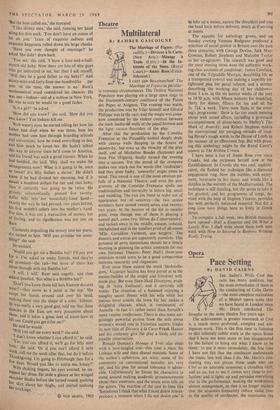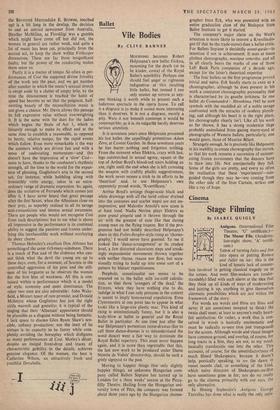Opera
Pace Setting
By DAVID CAIRNS
THE Sadler's Wells Cosi fan torte has many qualities, but the most remarkable of them is the conducting of Colin Davis —the most complete realisation of a Mozart opera score that we have heard in London since Mr. Davis conducted The Seraglio in the same theatre five years ago.
The achievement is greater inasmuch as Cosi is a much more profound, complex and am- biguous work. This is the first time in listening to this infinitely subtle work in the opera house that I have not been more or less disappointed by the failure to bring out what I know to be there: to put it more immodestly, the first time I have not felt that the conductor understands the music less well than I do. Mr. Davis's con- ducting may not please those souls who see Cosi as an adorable nonsense, a cloudless idyll, and so on, but to me it comes very close to per- fection; and it lights up and pervades everything else in the performance, making the weaknesses almost unimportant, so that it no longer matters that the acoustics frequently reduce violin tone to the quality of sandpaper, the translation (by
the Reverend Marmaduke E. Browne, touched up) is a bit long in the dewlap, the decision to cast an untried newcomer from Australia, Heather McMillan, as Fiordiligi was a gamble which might have come off but did not, the women in general are rather weak, and quite a lot of music has been cut, principally from the second act, to keep the show within Volksoper dimensions. These are far from insignificant faults; but the power of the conducting makes them seem so.
Partly it is a matter of tempo. So often in per- formances of Cosi the supposed divine frivolity of the work sets the pace, and we get number after number in which the music's sensual stretch is swept aside by a clatter of empty brio; by the time the denouement is reached the habit of speed has become so set that the poignant, half- swirling beauty of the reconciliation music is not given a chance. Mr. Davis allows this passage its full expressive value without overweighting it. It is the same with the duet for the ladies which begins the finale of Act 1, which is leisurely enough to make its effect and at the same time to establish a reasonable, as opposed to hectic, relative tempo, for the rapid events which follow. Even more remarkable is the way the numbers which are driven fast and with a sense of undeviating momentum—and this doesn't have the impression of a 'slow' Cosi- seem to have, thanks to the conductor's rhythmic strength, all the time in the world for the expan- sion of phrasing. Guglielmo's aria in the second act, for instance, while bubbling along with irresistibly virile energy, takes in an extra- ordinary range of dramatic expression. So, again, does the recitative of Ferrando which comes just after it. I have never heard that, great passage after the first Sextet, when the Albanians close on their prey, so superbly realised in all its savage anti-romanticism and intense sexual awareness. There are people who would not recognise Cosi from such descriptions; but to me what is above all impressive in the performance is its continual ability to suggest the passions and ironies under- lying this inexhaustible work without overlaying its sheer charm.
Thomas Helmsley's excellent Don Alfonso has something of the same rich many-sidedness. There is a touch of Pan and of the clubman who can- not think what the devil the young are up to these days, even, for a moment, of Scarpia in the controlled aggression of his pose and the still- ness of his lorgnette as he observes the women for the first hint of weakness. All this is con- tained within a performance which is a model of style, economy and quiet dominance. The other two men are also admirable: John Wake- field, a Mozart tenor of rare promise, and Donald McIntyre whose Guglielmo has just the right virile warmth and geniality; it is typical of the staging that their 'Albanian' appearance should be plausible as a disguise without being fantastic. I lack space to discuss Glen Byam Shaw's sen- sible, unfussy production; not the least of its virtues is its capacity to be funny while com- pletely avoiding the horseplay which disfigures so many performances of Cosi. Motley's ddcor, despite an insipid front-drop and traces of characteristic gentility in the details, achieves genuine elegance. Of the women, the best is Catherine Wilson, an attractively fresh and youthful Dorabella.















































 Previous page
Previous page